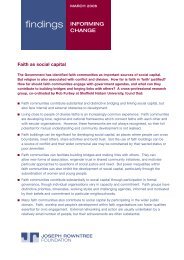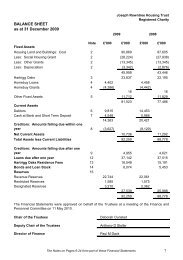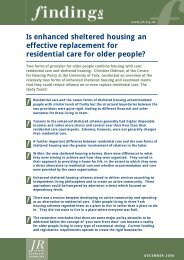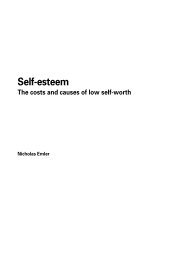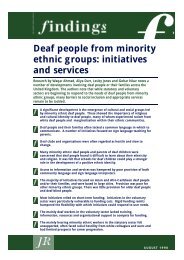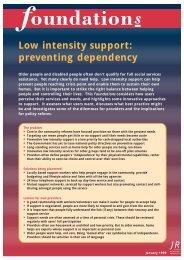Community participation - Joseph Rowntree Foundation
Community participation - Joseph Rowntree Foundation
Community participation - Joseph Rowntree Foundation
Create successful ePaper yourself
Turn your PDF publications into a flip-book with our unique Google optimized e-Paper software.
<strong>Community</strong> <strong>participation</strong><br />
The 1% Solution<br />
If we accept the premise that elites have an important role to play, what are the<br />
principles that might underpin an agenda for policy and practice, which is<br />
simultaneously more radical and more realistic than that which is presently on offer.<br />
First, it’s not getting everyone to participate in governance that matters. It’s getting<br />
governance to reflect the contribution of a much wider range of types of <strong>participation</strong>.<br />
From the committed few who join the board of the local partnership to the many<br />
more who get involved informally in organisations that feel closer to home, the trick is<br />
to ensure that everyone’s <strong>participation</strong> counts towards making the system as a whole<br />
more effective and legitimate, even if it cannot count equally.<br />
Second, rather than try to change people’s <strong>participation</strong> so it fits existing structures,<br />
we should change the structures so they fit people’s <strong>participation</strong>. Instead of trying to<br />
corral the young people who attend a youth club or the mums in a playgroup into<br />
getting involved in governance, we should ask how governance can get involved with<br />
them. How can formal structures plug into the everyday social networks people do<br />
choose to inhabit, so that a much wider section of the community understands where<br />
the opportunities for influence are, and is far fewer steps removed from being able to<br />
use them?<br />
Third, we need to pay much closer attention to the incentives for <strong>participation</strong>, and<br />
these are fundamentally about the devolution of power. Participants in governance<br />
will find it much easier to mobilise others and plug into their networks if the formal<br />
structures they inhabit are places where real power lies. They need to be able to<br />
invite people to join in the creative act of doing something for the community, not<br />
simply in making decisions about what others plan to do.<br />
Fourth, the goal of policy should not be to invent ever more structures of<br />
<strong>participation</strong>, even though this is much easier to do, but to invest in changing<br />
cultures of <strong>participation</strong> in the long term.<br />
Fifth, if these principles were adopted, we could begin to realise a system that not<br />
only mobilised 1 per cent of citizens to participate actively in governance but was<br />
also more legitimate, effective and a more promising basis on which to build for the<br />
future than the one we have now. From this our approach derives its name: The 1%<br />
Solution.<br />
50



